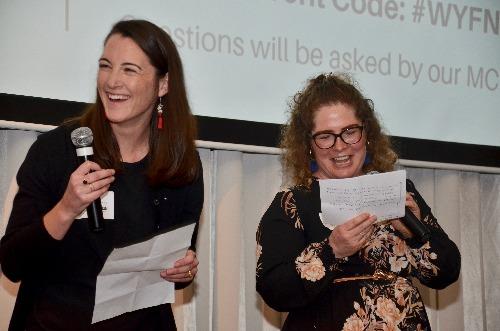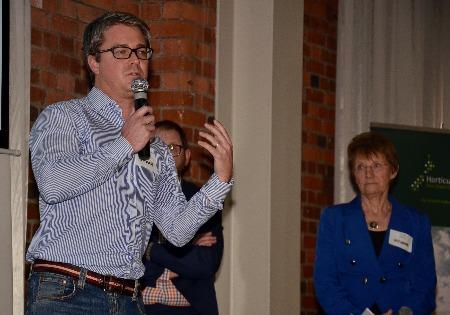Young Farmers ‘Next 50’ message: move with the times or wither

by Simon Edwards
14 September, 2018
There were some blunt words on glyphosate, fake meat burgers and farmers who won’t embrace change at the Wellington Young Farmers Club’s 2018 Industry Function.
During a panel discussion The Next 50: Future of Farming the conversation roved from 3D conferencing and holograms to Maori business models, and from disruptive technologies to milking sheep.
Dr Linda Sissons, of the Primary ITO, agreed with other speakers that increasing numbers of people will need to re-train every 10 or 15 years, if not more frequently. Her organisation was introducing a suite of ‘Micro-credentials’ – short and sharp courses that farmers and others in the primary sectors could study in between other commitments.
“Change outside the primary sectors is happening so intensively and overwhelmingly…it’s almost like if you don’t learn something different, you’ll be doomed,” she said.
“We all know about disruption – it creeps up behind you and all of a sudden you have to do things differently. The primary industries are being disrupted all the time. I was actually pleased to see Air New Zealand put up their funny burger. I hope it gets people thinking very hard because these things are coming at us.
“The more you let disruption into your life, the more you absolutely have to change and improve.”
Fellow panellist Andrew Sliper, Pāmu’s commercial development manager, answered a question about what to do about farmers who aren’t getting on board with sustainability and traceability.
“This is going to sound a bit horrible,” he said, “but do we really need to look after some of these people? We’re not a charity, we’re running a business here.”
Andrew gave some examples of people within Pāmu who were well into their sixties and, as long as they could see there was a place for them in the organisation, were invigorated and excited when they get to interact with drone pilots and software specialists, or were challenged with investigating diversifying into beekeeping, plantation forestry, etc.
“If you’re not following social media, not following what your industry bodies are telling you, then that’s on you. There’s some pretty clear messages out there at the moment on how we should be running farms.
“If someone is that resistant to change, that stuck in the mud about what they are doing, it’s not our job to support them. If they’re given opportunities and the information is there but they’re not willing to take it, it’s not our fault.”
One of the Young Farmer members wanted to know about the future of glyphosate. Beef & Lamb Chairman Andrew Morrison noted that with actions such as Brazil banning it, an American court awarding a large compensation claim to a worker affected by it and other debate about pesticides and production methods, it’s not a topic that is going to fade away.
Special agricultural trade envoy Mike Peterson, who MC’d the evening, said he’d been in Europe a month ago and learned they could ban glyphosate’s use in 2023.
“You know what’s going to happen when they ban it over there and we’re still using it here. They’ll say we’re poisoning their consumers, even though the science doesn’t back that.
“Politicians over there said to me, ‘Mike, the science in this is irrelevant. The people have spoken’.”
Andrew Sliper said this was where the industry goes a bit wrong. With topics such as The Impossible Burger and glyphosate, it won’t be farmers who decide the issue, “it’s going to be the customer”.
Trying to ban use of the word ‘meat’ by plant-protein patty makers “is the most regressive way of dealing with a competitor.
“Instead we should try to understand what motivates people to eat those burgers…they’re worried about the environment. Can we deliver on that with animal protein? Bloody oath we can!”
Andrew said our provenance narrative on grass-fed, well looked-after animals and landscapes was “beautiful”.
“Let’s nail that story, not try and say ‘that’s wrong because that burger uses GMO props, or they do this or that in their process’. If we start talking about all these technical details to run the competition down, we’ve lost the argument.”
Captions:
Sarah Braun (left) and Eve Williams of the Wellington Young Farmers Club welcomed participants to their Annual Industry Function.
Pāmu commercial development manager Andrew Sliper makes a point, watched by fellow panellists TUANZ chief executive Craig Young and Primary ITO’s Dr Linda Sissons.